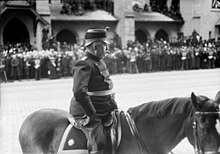Ulrich Wille
Inspired by the Prussian techniques that he had been able to observe at the time of his studies in Berlin, he attempted to impress the Swiss Army with a spirit based on instruction, discipline and technical control.
[1] From the beginning of his activity as an instructor in Thun in 1872, Wille reflected on the methods to be applied in his field and published articles on military policy.
[1] Upon the outbreak of the First World War, Switzerland confirmed its will to remain neutral and issued a general mobilization of all military forces.
As a Germanophile, close to Kaiser Wilhelm II, Wille benefitted from the pro-German current and the disparity within the Swiss Federal Council, which counted only one member from the French areas.
A scandal occurred in the French-speaking area of Switzerland when Wille proposed to the Federal Council on 20 July 1915, to enter the war on the side of the Central Powers.
In a note dated 10 November 1918, Wille announced his concern for the rise of Bolshevism and the internal disorders to come in the country: Two years ago, I was brought on several occasions to share with the Federal Council my conviction that the congresses of Zimmerwald and Kiental had decided to begin with Switzerland the process of inversion of the established order in Europe.
Everyone knows that many messengers of Russian Bolsheviks, having vast sums of money, are in Switzerland with an aim of exploiting the situation and to accelerate the execution of this plan.But he added that it was necessary to avoid violence: We should not seek the confrontation, nor the civil war.
This has been known for a long time and this is why the Confederation must intervene in time.Meanwhile, Wille had to manage the pandemic of the Spanish influenza, which affected the troops and the recruit schools.
His daughter Renée Schwarzenbach-Wille, who was married to silk tycoon Alfred Schwarzenbach, was an Olympic horsewoman and prolific photographer.


